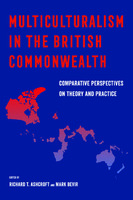Multiculturalism in the British Commonwealth
Comparative Perspectives on Theory and Practice
| dc.contributor.editor | Ashcroft, Richard T. | |
| dc.contributor.editor | Bevir , Mark | |
| dc.date.accessioned | 2019-08-14 14:08:22 | |
| dc.date.accessioned | 2020-04-01T10:10:16Z | |
| dc.date.available | 2020-04-01T10:10:16Z | |
| dc.date.issued | 2019 | |
| dc.identifier | 1005296 | |
| dc.identifier | OCN: 1135854788 | en_US |
| dc.identifier.uri | http://library.oapen.org/handle/20.500.12657/24809 | |
| dc.description.abstract | Cultural diversity raises pressing issues for both political theory and practice. The remaking of the world since 1945 has led to increased demographic diversity within many states, and greater acknowledgment of its worth. “Multiculturalism” refers to the political, legal and philosophical strategies which emerged to accommodate this newfound social diversity, and the accompanying public debates. Each chapter explores particular state responses to cultural diversity, utilizing various disciplinary approaches but addressing common questions: What is “multiculturalism,” and why did it come about? What dilemmas has it posed for liberal-democratic governance? How have these been responded to in theory and practice, and are the different responses adequate? Are there alternative approaches to cultural diversity that have been overlooked? Issues covered include immigration, national minorities, indigenous peoples, nation-state building, liberal-democratic citizenship, constitutionalism, nationalism, group politics, political economy, secularism, globalization, decolonization, and the relationship between social theory and practice. The volume situates modern multiculturalism in its national, international and historical contexts, tracing the historical roots of present dilemmas to the intertwined legacies of imperialism and liberalism. It thereby shows that multiculturalism has implications which stretch beyond its current formulations in both public and academic discourse, casting doubt on basic assumptions behind modern liberal democracy, and even on the viability of the nation-state in its present form. The Editors’ overall conclusion is that reorganizing governance to be more polycentric in structure, and pluralist in orientation, would be a fruitful response to multiculturalism in both theory and practice. | |
| dc.language | English | |
| dc.subject.classification | thema EDItEUR::N History and Archaeology::NH History::NHB General and world history | en_US |
| dc.subject.other | multiculturalism | |
| dc.subject.other | liberal democracy | |
| dc.subject.other | citizenship | |
| dc.subject.other | imperialism | |
| dc.subject.other | decolonization | |
| dc.subject.other | governance | |
| dc.subject.other | globalization | |
| dc.subject.other | British Commonwealth | |
| dc.subject.other | diversity | |
| dc.subject.other | polycentricity | |
| dc.subject.other | pluralism | |
| dc.title | Multiculturalism in the British Commonwealth | |
| dc.title.alternative | Comparative Perspectives on Theory and Practice | |
| dc.type | book | |
| oapen.identifier.doi | 10.1525/luminos.73 | |
| oapen.relation.isPublishedBy | 72f3a53e-04bb-4d73-b921-22a29d903b3b | |
| oapen.relation.isbn | 9780520299320 | |
| oapen.pages | 315 | |
| oapen.place.publication | Oakland | |
| oapen.identifier.ocn | 1135854788 |

